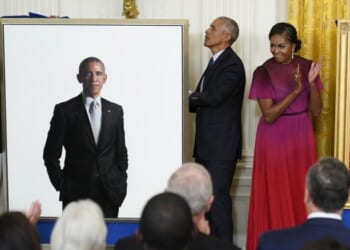
The Senate voted late Tuesday to terminate the emergency powers that President Trump used to impose tariffs on goods from Brazil, a major coffee producer and South American trading partner.
Five Republicans joined every Democrat in the 52-48 vote, a largely symbolic effort to put Republicans on record in support or opposition to tariffs that have caused ripples in the global economy.
The disapproval resolution was sponsored by Sen. Tim Kaine of Virginia, other Democrats and Sen. Rand Paul of Kentucky, a Republican who’s criticized Mr. Trump’s tariffs and says Congress needs to reassert its authority.
Senators backing the measure said Mr. Trump’s decision to impose a 50% tariff on Brazilian goods would ultimately hurt American consumers.
“Prices for all kinds of everyday goods — including coffee, much of which is imported from Brazil — are climbing,” Mr. Kaine said. “We must stop Trump from starting these incompetent and chaotic trade wars that are weakening our economy.”
The Republican-led House will ignore the resolutions, making the Senate vote a messaging exercise that forces each senator to go on record about Mr. Trump’s use of tariff power.
Mr. Trump says tariffs, or duties on foreign goods brought into U.S. markets, are a good way to create revenue, gain leverage over other countries and protect U.S. industries and workers.
Vice President J.D. Vance stressed those points during a Senate GOP luncheon on Tuesday. He lobbied senators to vote against the Brazil resolution and similar measures that will target Mr. Trump’s tariffs on Canada and other trading partners.
“The point that I made to my Republican colleagues, recognizing there’s a diversity of opinions about it, is that the tariffs give us the ability to put American workers first. They force American industry to reinvest in the United States of America instead of a foreign country. They’re also incredible leverage for the president of the United States in negotiating these trade deals overseas,” he said.
Mr. Vance said Mr. Trump’s trade deals to date happened “because the president of the United States has been willing to use tariffs to give American workers and American farmers a better deal.”
“To vote against that is to strip that incredible leverage from the president of the United States,” Mr. Vance said after the lunch. “I think it’s a huge mistake, and I know most of the people in there agree with me.”
Mr. Trump imposed sweeping tariffs on North American neighbors and dozens of global trading partners earlier this year, citing problems like fentanyl trafficking and trade deficits with countries that sell plenty of goods to the American market but don’t buy nearly as much from U.S. producers.
The president hit Brazil hard because he was upset about the prosecution of ex-Brazilian leader Jair Bolsonaro, a key Trump ally. Mr. Trump recently had a cordial meeting with Brazilian President Luiz Inácio Lula da Silva, though the levies are in place for now.
Whether Mr. Trump has the power to impose tariffs unilaterally, without Congress, has been a running subplot of his second term. It is the subject of a major case before the Supreme Court that could determine whether Mr. Trump acted lawfully by invoking the International Emergency Economic Powers Act.
The administration says Mr. Trump is working within the parameters of the 1977 law.
Republican leaders in the House and Senate have been happy to let Mr. Trump work his will on trade, hoping he can secure favorable agreements with other nations.
Some lawmakers also want to see how the justices rule before putting their stamp on tariff authority.
“I just want the trade agreements to conclude as quickly as possible. I don’t see how undermining whatever Trump’s trying to do helps those negotiations get completed,” Sen. Ron Johnson, Wisconsin Republican, said earlier this week. “The Supreme Court will hopefully rule pretty quick on the tariff authority, so we know one way or the other, and then we can start dealing with it.”
Democrats are trying to block new tariffs with help from a handful of GOP lawmakers like Mr. Paul, a libertarian who believes tariffs can harm Americans.
“I am alarmed by the Brazilian government’s persecution of a former president and authoritarian repression of freedom of speech, but that has no bearing on the constitutional limits of our own executive,” Mr. Paul said before the vote. “The president of the United States does not have the authority under IEEPA to unilaterally impose tariffs. Trade policy belongs to Congress, not the White House.”
Sen. Mitch McConnell, Kentucky Republican, said protectionist policies harmed bourbon makers and farmers in his state.
“Tariffs make both building and buying in America more expensive. The economic harms of trade wars are not the exception to history, but the rule. And no cross-eyed reading of Reagan will reveal otherwise,” Mr. McConnell said, a veiled reference to Mr. Trump’s complaints about an Ontario-sponsored ad that used President Ronald Reagan’s words to criticize U.S. tariffs on its goods.
Sen. Thom Tillis, North Carolina Republican, said he voted in favor of the Brazil resolution because those tariffs appeared to be imposed for non-trade reasons, namely the Bolsonaro prosecution.
“Brazil had a trade surplus, and the impetus behind [the tariff] appears to be a disagreement with the judicial proceeding. I just don’t think that’s a strong basis for using the trade lever,” Mr. Tillis said.
Republican Sens. Susan Collins of Maine and Lisa Murkowski of Alaska also voted to terminate the Brazil tariffs.
Beyond the Brazil measure, Democrats and Mr. Paul have filed resolutions condemning Mr. Trump’s tariffs on Canada and a third resolution attacking his reciprocal levies on all other countries.
Mr. McConnell, in his written statement, said he planned to vote in favor of all of the measures.
In April, the Senate narrowly passed a resolution to nullify a fentanyl-related 25% tariff that Mr. Trump imposed on Canada, with four Republicans joining all Democrats in support.
The House has not considered the measure.








